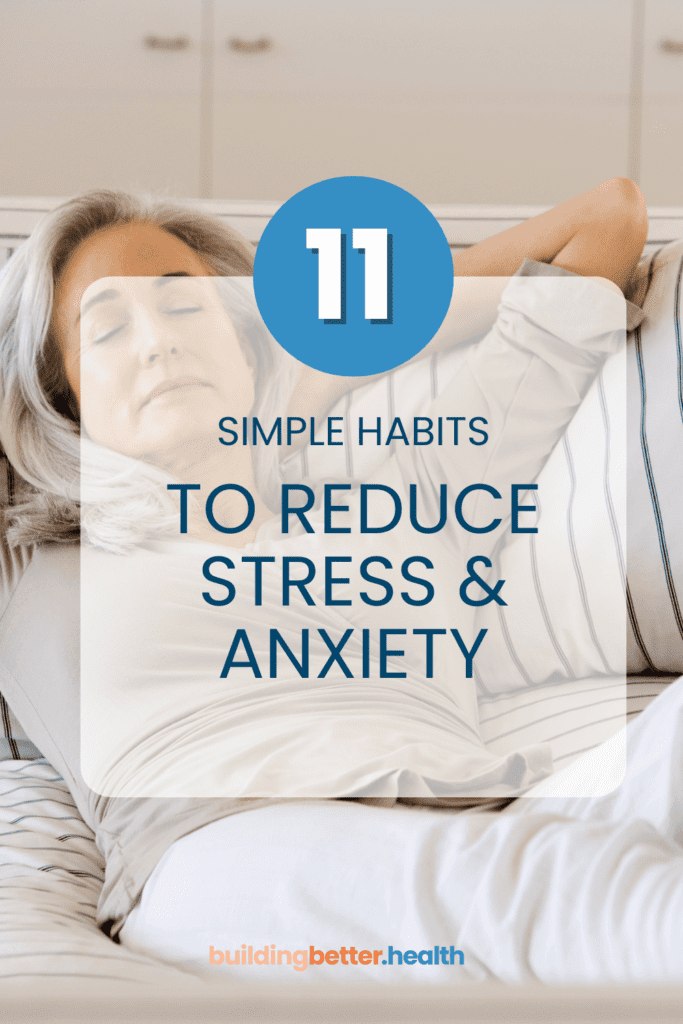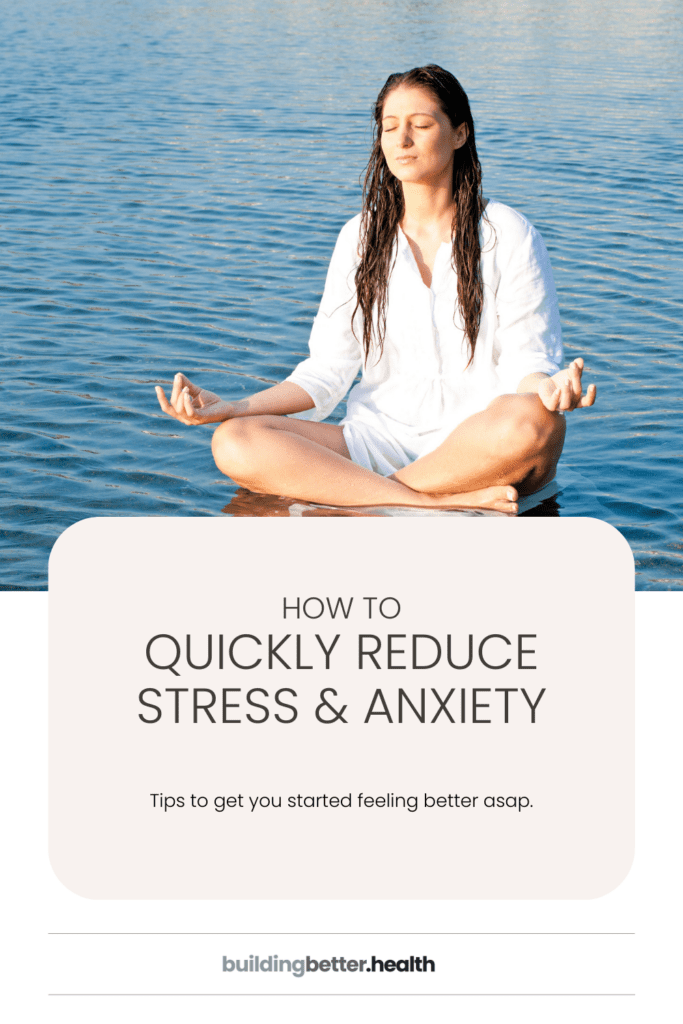
Please note: This website contains affiliate links. As an Amazon Associate, we earn from qualifying purchases at no additional cost to you.
Feeling overwhelmed by daily life? You’re not alone. Everyone seems to be a bit more stressed these days, but there are some simple ways to get a handle on things. We’ll look at different techniques and some simple habits to relieve stress and help you find some balance.
Key Takeaways
- Develop effective habits to manage stress and improve overall well-being
- Incorporate physical activity, healthy eating, and mindfulness practices to reduce anxiety
- Cultivate a positive mindset, nurture social connections, and set healthy boundaries
- Prioritize quality sleep and explore relaxation techniques like yoga and journaling
- Seek professional support, such as counseling or therapy, to address persistent stress

#1 | Embrace Physical Activity
Regular physical activity is a great way to manage stress and anxiety. It can be as simple as going for walks or jogs. Exercise helps release energy and boosts mood with endorphins.
Engage in Exercise Routines
There are many types of exercise that help with stress relief and well-being. Activities like cardio, strength training, and interval training are beneficial. They improve fitness and help clear your mind.
Try to mix aerobic exercise and mindful movement in your routine. This will give you the best physical activity benefits.
Go for Walks or Jogs
Going for a walk or jog can be a great stress reliever. It offers a break from daily tasks and helps you relax. Even short walks or jogs can make a big difference in your exercise for stress relief.
“Engaging in regular physical activity can lower blood pressure, improve cholesterol levels, and reduce the risk of chronic diseases like heart disease and diabetes.”
Physical activity is a powerful tool for managing stress and anxiety. It can be through structured workouts or simple walks. Adding mindful movement to your routine can dramatically improve your mental and physical health. Taking small steps to create habits to relieve stress can lead to a big payoff in the weeks and months to come.
#2 | Nourish Your Body
Eating well can help manage stress. Stress-reducing foods give your body the nutrients it needs. Foods like oatmeal and oranges boost your mood and immune system.
Eat a Healthy, Balanced Diet
Adding nutritious, stress-relieving foods to your meals can help. Try these stress-busting foods:
- Fatty fish like salmon and tuna, rich in omega-3 fatty acids that can regulate stress hormones and protect against depression.
- Nuts and seeds, such as pistachios and almonds, which provide healthy fats, vitamins, and minerals to support overall health.
- Berries, including strawberries, raspberries, and blueberries, packed with vitamin C to help stabilize blood pressure and cortisol levels.
- Dark chocolate, which can help reduce cortisol levels and provide antioxidants for heart health.
- Chamomile tea, a soothing beverage known for its stress-relieving properties.
Avoid Unhealthy Coping Mechanisms
It’s easy to fall into bad habits like too much caffeine or alcohol. But these can make stress worse. Instead, choose healthy coping strategies that help your body and mind.
By choosing stress-reducing foods and avoiding bad habits, you can manage stress better. This approach improves your nutrition for mental health.
#3 | Practice Mindfulness Techniques
Mindfulness can be a strong tool for handling stress and finding peace. It helps you stay in the present and notice your thoughts, feelings, and body sensations. This way, you can release worries and gain clarity and control.
Try Meditation and Deep Breathing
Meditation and deep breathing are great for your mind and body. Meditation can calm your mind, lessen anxiety, and boost focus. Deep breathing, meanwhile, can relax your body by triggering its natural calm response.
- Try to meditate for 10-15 minutes each day, focusing on your breath or a mantra.
- Use deep breathing methods like the 4-7-8 technique. Breathe in for 4 seconds, hold for 7, and breathe out for 8.
- Explore various mindfulness activities, like walking meditation or mindful tea drinking, to find what works for you.
Regularly practicing these mindfulness for stress relief methods can deeply affect how you manage stress management through mindfulness. It helps you become more aware of the present moment awareness.
“Mindfulness is not about changing anything. It’s about seeing things as they are.” – Jon Kabat-Zinn
#4 | Cultivate a Positive Mindset
Starting a new year means we must stay positive, even when things get tough. Studies prove that being optimistic can make us live longer and feel better. A positive mindset helps us deal with stress and reach our goals.
Laugh More and Stay Optimistic
Laughing more is a great way to stay positive. Laughter can make us feel better and release tension. Sharing jokes or trying laughter yoga can change our day for the better.
Positive self-talk and changing negative thoughts also help. Focusing on what we can control and being thankful for the good things in our lives makes us stronger. This helps us handle stress better.
“The greatest weapon against stress is our ability to choose one thought over another.” – William James

Let’s make a promise to ourselves for the new year. Let’s think positively and use laughter to improve our well-being. By being grateful and resilient, we can use positive thinking to overcome life’s hurdles.
#5 | Nurture Social Connections
Keeping strong social ties is key to managing stress and boosting well-being. Spend quality time with loved ones, in person or online. This brings comfort, support, and a sense of belonging, helping us face daily life’s challenges.
Being part of a community, like volunteering or joining a club, adds to our sense of purpose. Having a network of supportive people helps us thrive emotionally.
Studies show the health perks of strong social bonds. People with good connections feel less stressed, sleep better, and live longer. It’s vital to build and keep these relationships for our well-being.
To grow your social connections, try these:
- Regularly catch up with friends and family, in person or online.
- Volunteer or join a group that matches your interests and values.
- Do activities that help you meet new people and expand your circle.
- Show gratitude to those close to you to strengthen your bonds.
By focusing on social support for stress relief, healthy relationships, and community engagement, we can manage stress better. This is crucial for our overall health.
“Loneliness and social isolation are as damaging to our health as smoking 15 cigarettes a day.” – Surgeon General, U.S. Department of Health and Human Services
| Benefit | Impact |
|---|---|
| Reduced Stress | Strong social connections help lower stress levels and promote better emotional well-being. |
| Improved Mental Health | Meaningful relationships can alleviate symptoms of depression and anxiety, and provide a sense of belonging. |
| Enhanced Physical Health | Social connections are linked to a lower risk of many health problems, including high blood pressure and unhealthy weight. |
| Longer Life Expectancy | Older adults with strong social support are more likely to live longer compared to those with fewer social connections. |
#7 | Set Healthy Boundaries
Setting healthy boundaries is key to managing stress and living a balanced life. Saying “no” to things we can’t handle helps avoid burnout. It also improves our work-life balance. By saying no, we make time for self-care activities that recharge us.
At first, setting boundaries might feel hard. But it’s a big step towards relieving stress and a more fulfilling life. Studies show that about 33% of people find it hard to express their needs and set boundaries. Yet, setting healthy boundaries can make us feel more empowered, leading to better emotional balance and peace of mind for around 63% of individuals.
Learn to Say No
Learning to say “no” without feeling guilty is crucial for setting boundaries. It’s especially tough for those who always put others first. But saying no to things we can’t handle frees up time and energy for our own well-being.
- Practice becoming an observer to stress, which can enhance responsiveness by about 47%.
- Explore time management strategies to help you prioritize your time and energy.
- Remember that setting boundaries demonstrates good habits to family, friends, and coworkers, ultimately benefiting your relationships.
Healthy boundaries are a powerful way to reduce stress and improve work-life balance. By saying no and focusing on our needs, we can lead a more balanced and fulfilling life.
#8 | Explore Yoga and Relaxation Practices
Adding yoga for stress relief and relaxation techniques to our daily lives can help manage stress. Yoga combines physical poses, breathing, and meditation for a holistic approach. It also helps us find peace in our busy days.
Studies show that yoga practice can lessen anxiety symptoms, especially in those with anxiety disorders. It boosts GABA levels, a brain chemical that calms us. This is why yoga makes us feel balanced and relaxed.
Specific yoga poses like Child’s Pose and Cat-Cow can reduce stress and balance our body. Breathwork like diaphragmatic breathing also lowers stress hormones.
Meditation focuses on the breath and the now, quieting the mind and lowering heart rate. It helps with anxiety and improves mental health. Regular practice can change our brain and nervous system, reducing stress over time.
| Relaxation Technique | Description | Benefits |
|---|---|---|
| Progressive Muscle Relaxation | A two-step process of systematically tensing and releasing different muscle groups to become more aware of tension and relaxation. | Helps reduce physical tension, lower heart rate and blood pressure, and promote a sense of calm. |
| Body Scan Meditation | Focuses attention on different parts of the body, promoting mindful awareness of bodily sensations without judgment. | Enhances present-moment awareness, reduces stress and anxiety, and fosters a sense of relaxation. |
| Visualization and Guided Imagery | Involves creating peaceful mental images to reduce tension and anxiety, often with the guidance of an audio recording. | Decreases physiological arousal, promotes a state of calm, and helps individuals find moments of inner tranquility. |
| Self-Massage | Utilizing touch and pressure to release muscle tension and improve circulation in different parts of the body. | Provides a simple, accessible way to practice self-care and stress relief without the need for professional intervention. |
By adding mindful movement and restorative practices to our lives, we can find balance and well-being. There are many relaxation techniques to try. Finding what works for you can help you build strong daily habits to relieve stress and remain calm.
#9 | Prioritize Quality Sleep
Getting quality sleep is key for managing stress. When you’re well-rested, you can tackle daily life better. A calming bedtime routine gets your mind and body ready for sleep.
Establish a Calming Bedtime Routine
Try light stretching, reading, or gentle meditation before bed. These activities help you relax and make falling asleep easier. Stay away from electronic devices an hour before bed, as they can mess with your sleep cycle.
- Make your bedroom sleep-friendly by keeping it cool, dark, and quiet.
- Stick to a regular sleep schedule, even on weekends, to keep your body clock in sync.
- Drink less caffeine and alcohol, as they can hurt your sleep quality.
By focusing on sleep and setting up a soothing bedtime routine, you boost your well-being and stress resilience.
| Sleep Statistic | Percentage |
|---|---|
| Adults who have trouble falling or staying asleep | 30% |
| Adults who experience sleeping difficulties | 30% |
| Adults who suffer from daytime sleepiness | 25% |
| Adults who accumulate 1 hour or more of sleep debt per week | 30% |
| Adults who accumulate 2 hours or more of sleep debt per week | 10% |
| Adults who experience 1 hour or more of social jet lag | 50% |
By focusing on quality sleep and stress management, and setting up healthy sleep habits and a calming bedtime routine, you can improve your overall well-being and stress resilience.
#10 | Creating New Habits to Relieve Stress
Building habits that let us express ourselves creatively can really help with stress. Journaling lets us write freely about our feelings, offering a way to release and process. Also, creative hobbies like painting or playing music can be a fun break from daily stress. These expressive arts help us find new ways to deal with stress and reflect on ourselves.
Journaling is especially good for stress relief. Research shows it helps us understand our feelings better and find emotional balance. By making journaling a regular habit, we can improve our well-being and handle stress better.
Creative hobbies are also great for managing stress. Activities like painting or playing music offer a break and let us express ourselves. These expressive arts are a powerful way to deal with emotions and find happiness, even when things are tough.
By adding journaling and creative hobbies to our daily lives, we tap into self-reflection and creative expression. These habits help us not just cope with stress but also grow and feel better over time.
“Creativity is a great stress reliever. It takes your mind off your problems.” – Demi Lovato
#11 | Seek Professional Support
Developing personal habits can help manage stress, but sometimes, we need professional help. Talking to a mental health counselor or therapist can offer insights and strategies tailored for us. They help find the stress causes, create plans to reduce it, and guide us in making positive changes. Getting help from experts can be a key step in our journey to relieve stress and better our well-being.
Consider Counseling or Therapy
If personal efforts to manage stress don’t work, seeking professional help for stress can help a lot. Counseling or therapy provides a safe space to explore stress causes, learn coping skills, and understand our emotions better. These mental health services offer valuable guidance and support, helping us face tough times with more resilience and clarity.
Studies show that social support is key to managing stress well. People with strong social ties are more resilient under stress, feeling less stressed and showing lower physical responses. Building meaningful relationships and seeking professional support together can boost our well-being and make life’s challenges easier.
“Seeking support from a qualified professional can be a transformative step in managing stress and improving overall well-being.”
If you’re dealing with anxiety, burnout, or a specific life challenge, professional mental health counseling or therapy can help. Working with experts in stress reduction and emotional wellness can teach you to manage stress, develop coping skills, and build a more positive mindset.
Conclusion
In conclusion, by adding effective habits to our daily lives, we can reduce stress. Stress relief is possible through physical activity, healthy eating, and positive thinking. Each method offers a way to lower stress and improve our well-being.
By trying different strategies, we can manage stress better. This leads to a more fulfilling life. The path to stress relief is continuous, but with these habits, we can move towards a healthier future.
Adding exercise, mindfulness, or focusing on social connections can help. The summary of effective stress relief habits in this article gives us a clear plan. By using these strategies, we can improve our well-being and handle daily life more easily.

Please note: This website contains affiliate links. As an Amazon Associate, we earn from qualifying purchases at no additional cost to you.












